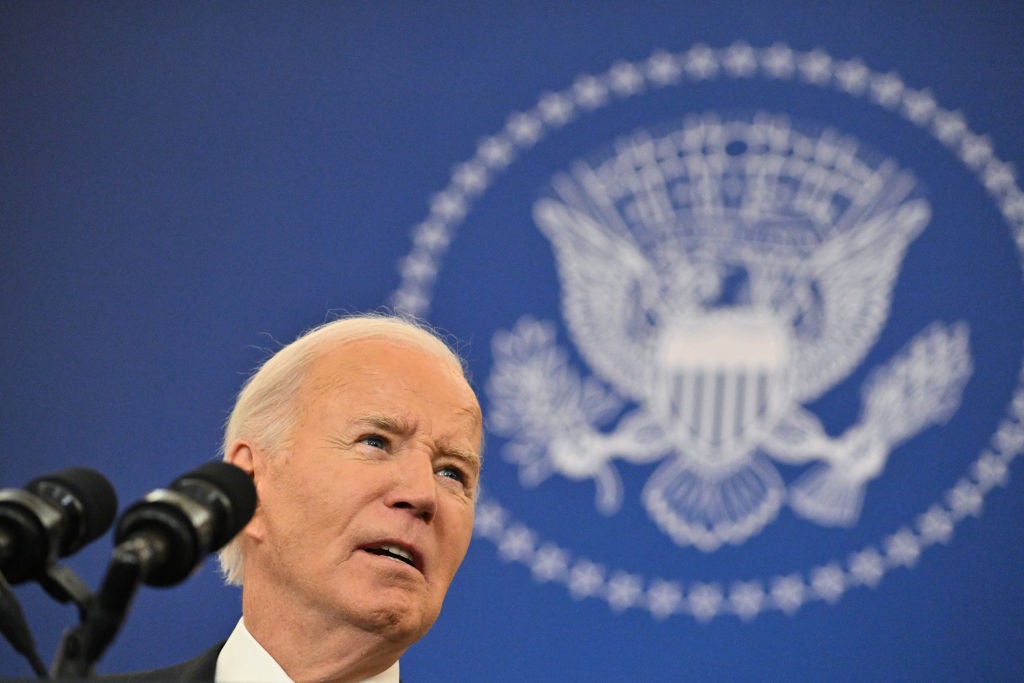Joe Biden concocts a positive image for his legacy while his party fumes over November
Analysis: The outgoing US president is seeking to define his presidency as more than just the lead-up to Kamala Harris’s defeat.
Your support helps us to tell the story
From reproductive rights to climate change to Big Tech, The Independent is on the ground when the story is developing. Whether it's investigating the financials of Elon Musk's pro-Trump PAC or producing our latest documentary, 'The A Word', which shines a light on the American women fighting for reproductive rights, we know how important it is to parse out the facts from the messaging.
At such a critical moment in US history, we need reporters on the ground. Your donation allows us to keep sending journalists to speak to both sides of the story.
The Independent is trusted by Americans across the entire political spectrum. And unlike many other quality news outlets, we choose not to lock Americans out of our reporting and analysis with paywalls. We believe quality journalism should be available to everyone, paid for by those who can afford it.
Your support makes all the difference.President Joe Biden is in the final stretch. Less than one week remains between him and his departure from the White House, Washington, and in all likelihood the American political stage as a whole.
He is working overtime to protect and define — on his terms — a legacy he once thought he’d have another four years to build. But his party and the broader American political world doesn’t seem to be on board with a vision that more and more are now saying is a delusion.
To draw that image of his one term in the White House, the president chose to make two final addresses this week. One occurred Monday, in front of staffers at the US State Department, focused on America’s global presence with Joe Biden at the helm. A second, his farewell address, will be delivered in primetime on Wednesday.
Both were set to deliver a much rosier view of his administration’s performance than even some members of his own party are willing to allow. And they have one shared goal: making the Biden presidency mean something more in the minds of Americans than simply being the vessel of Kamala Harris’s defeat to Donald Trump.
“Today, I can report to the American people, our sources of national power are far stronger than they were when we took office,” said Biden on Monday, adding that America’s adversaries were conversely “weaker than they were when we came into this job four years ago.”
He’d go on to boast that he was “leaving the next administration with a very strong hand to play,” with “an America that once again is leading, uniting countries, setting the agenda, bringing others together behind our plans and missions,” and one that is “no longer at war.”

In truth, the American public’s understanding of what “at war” means has changed dramatically, leaving Biden behind. No US service members are engaged in direct combat missions, yet the Pentagon just admitted that the number of troops in Syria is double that which had been reported for months. Meanwhile, the US Navy continues to clash with Houthi forces in the waters around Yemen and US forces assisted in intercepting missiles fired by Iran at Israel in October.
A media onslaught in his final days has undermined that image as well. On Sunday, CBS’s 60 Minutes aired an expansive investigation into the US’s role in the Israeli siege of Gaza, broadcasting shocking images of young children playing with unexploded US-made ordinance and other debris from US-supplied weapons. Former State Department officials told the network they were pressured to stop raising alarms about human rights abuses.
On MSNBC, the network that hired Biden’s former press secretary to host a show, primetime opinion host Chris Hayes denounced the president last week for leaving “a disgraceful legacy” with his virtually unwavering support for Benjamin Netanyahu and Israel’s government over the last year. That support was “doing untold damage to the liberal international order,” Hayes argued, as he asserted it undermined US condemnations of human rights abuses in places like China and Russia.
The president will make his case on domestic policy tomorrow night. That part of his legacy, however, comes with one big asterisk: Donald Trump. How many of his decisions and policy achievements survive the next four years, with the incoming president coming to Washington once again with unified control of Congress?

That question is coupled with the reality that Trump is aiming to implement a massive deportation program upon taking office, and along with a GOP Congress is likely to target transgender Americans as well. Republicans aim to pass a tax bill in the first year of Trump’s presidency, roll back environmental regulations, and more — all of which is set to be laid at Biden’s feet, thanks to the botched manner in which the outgoing president’s party handled the 2024 cycle.
Biden himself ensured that blame would come his way last week with a pair of statements claiming that the election had been winnable despite his decision to run for re-election well into July when he finally stepped aside after a disastrous debate performance.
The president told reporters that he “would have beaten Trump, could have beaten Trump”, then echoed those comments in a USA Today interview even while admitting that he wasn’t sure he could have served a full second term. Pod Save America’s Tommy Vietor called Biden’s answers “delusional thinking”.
No longer the public speaker he was even 5 years ago and lacking the support of most of his own party, Joe Biden is fighting an uphill battle to write his last chapter.
The continued silence of Kamala Harris, his vice president, makes the situation all the more uncertain for him. As she writes her own future, the woman called in at the last minute to replace the 46th president — who ran her campaign for just 107 days — may be the one to finish his as well.

Join our commenting forum
Join thought-provoking conversations, follow other Independent readers and see their replies
Comments